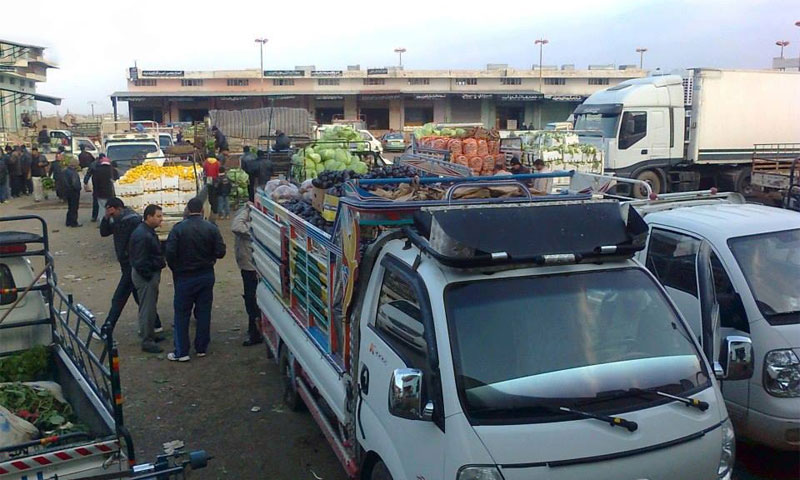



Enab Baladi – Murad Abdul Jalil
The areas under opposition control in southern Syria (Deraa and al-Quneitra) witness extensive economic exchange with areas under regime control following a reduction in the intensity of fighting between the two sides after the al-Assad forces took control of the city of al-Shiekh Miskin in the beginning of 2016.
The Free Syrian Army factions managed to gain control of important agricultural areas in Deraa and its outskirts in the first few years of the revolution including the eastern and western countryside and the Yarmouk Basin. Deraa is considered the “agricultural warehouse” of Syria generally and Damascus especially. The increase in the price of agricultural products in regime-controlled areas has forced the regime to allow traders from opposition-controlled parts of southern Syria to export their agricultural products to regime-controlled areas.
The commercial exchange between the two sides entailed mainly exchanging agricultural products for fuel and household products. The agricultural products are highly valued by Damascus residents while there are no industrial factories in the “liberated areas” in Deraa so there was a severe lack of household products. According to Abu Iyad al-Zaabi, a trader from Deraa city, this shortage forced traders in the liberated areas to import these products from regime-controlled areas.
Al-Zaabi explained to Enab Baladi that construction material, cement and fuel, in addition to household materials such as cleaning products, are the main products being brought into Deraa from areas under regime control. In exchange for these, different agricultural products – fruit, vegetables, wheat, olive oil, animal meats and animal products such as eggs, milk and yogurt – are transported from Deraa.
Despite continuous trading between the two sides, there are no official statistics due to the absence of officials to oversee the trading operations, which are entirely dependent on the traders and producers. “Any trader who wants to transport products to regime areas or bring them into the liberated areas must coordinate beforehand with another trader in the regime area, and they agree on the amounts required and the price. The only exception is wheat exported to the regime, which is sold according to regime prices, which are 125 Syrian pounds for one kilogram of wheat and 100 Syrian pounds for one kilogram of barley.”
The trader’s statements were confirmed by the Economic Administration Office of the Free Deraa Regional Council. The Office indicated that there is no directorate or economic or financial body overseeing trade between the regime and the opposition.
The Office clarified, “The issue has been discussed many times in the wings of the Free Economists’ Association, in addition to the difficulties and obstacles that prevent trade, among which is that most of the economies of the liberated areas depend commercially on what is brought in from regime areas.”
Many reasons prompted traders in the opposition areas to export their products to the regime as most of the agricultural products in Deraa and its countryside exceed the consumption needs of Deraa’s residents, according to the Economic Administrative Office.
The regime has made it impossible for liberated areas to trade among themselves, making them practically besieged economic enclaves. This contributed to increasing commercial exchange between the opposition and regime areas.
The most important reason for the trade is that the accumulation of agricultural products in opposition areas would lead to a decrease in price. According to the trader, Abu Iyad al-Zaabi, this would negatively affect farmers who might leave farming if they incur losses.
Al-Zaabi clarified that there are products that traders do not have to import from the regime such as fuel. These come from the “Islamic State” areas at times but the regime is the sole provider of other products, which increases their price.
The closure of the Nasseeb border crossing between Syria and Jordan in April 2015 halted all kinds of commercial exchange between the opposition and Jordan. Prior to the revolution, this border crossing was considered the most important gateway for commercial trade between the two countries.
The Economic Administration Office confirmed that, “The lack of trading opportunities with Jordan forced most traders and farmers to send their products to the markets under regime control in addition to importing the products they need from these areas.”
The border closure forced traders and farmers to pay bribes at checkpoints and incur high transportation costs, especially with the Syrian pound losing its value.
If the border crossing opens again, the liberated areas would be able to dispense with the products imported from regime areas. According to al-Zaabi, this is what traders and framers want to see happen, since the high prices of products in Jordan in comparison to prices in Deraa would mean traders who export to Jordan would make a big profit. For this reason, some traders are involved in smuggling products such as olive oil into Jordan.
Enab Baladi communicated with several military factions active in Deraa to find out their positions on the commercial exchange with regime areas. These factions refused to comment on the basis that they do not interfere with trade and have no connection with the issue.
Several sources in Deraa confirmed that some of the factions have commercial relations with regime areas and even with regime officers where those relations bring economic gain. However, al-Zaabi told us that the factions’ role is restricted to protecting the transportation of products, “In many cases you have to pay one of the military factions for assistance to protect the merchandise if it is very valuable whether it is imported or exported, for fear of robbery or gangs.”
Despite the commercial exchange with the regime, many famers in Deraa were forced to abandon farming after they suffered losses due to the battles that erupt from time to time and the low rainfall in 2015. This turn away from agriculture is worrying as this area is considered one of the most important agricultural zones in Syria.
if you think the article contain wrong information or you have additional details Send Correction